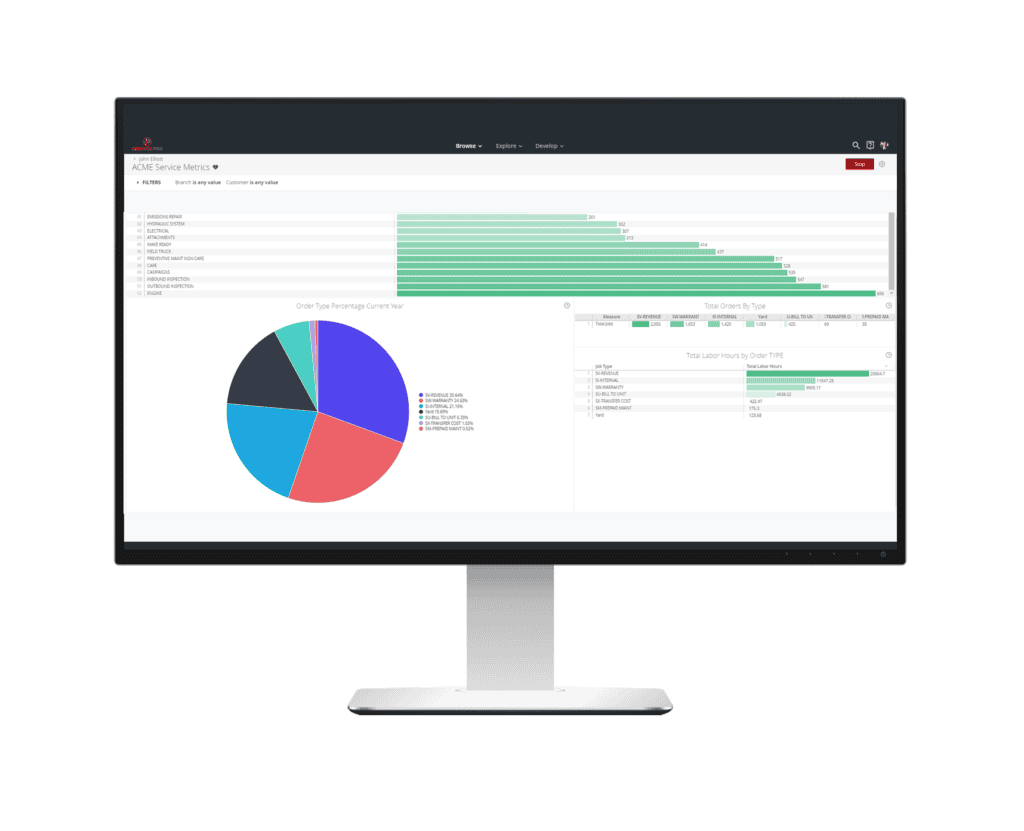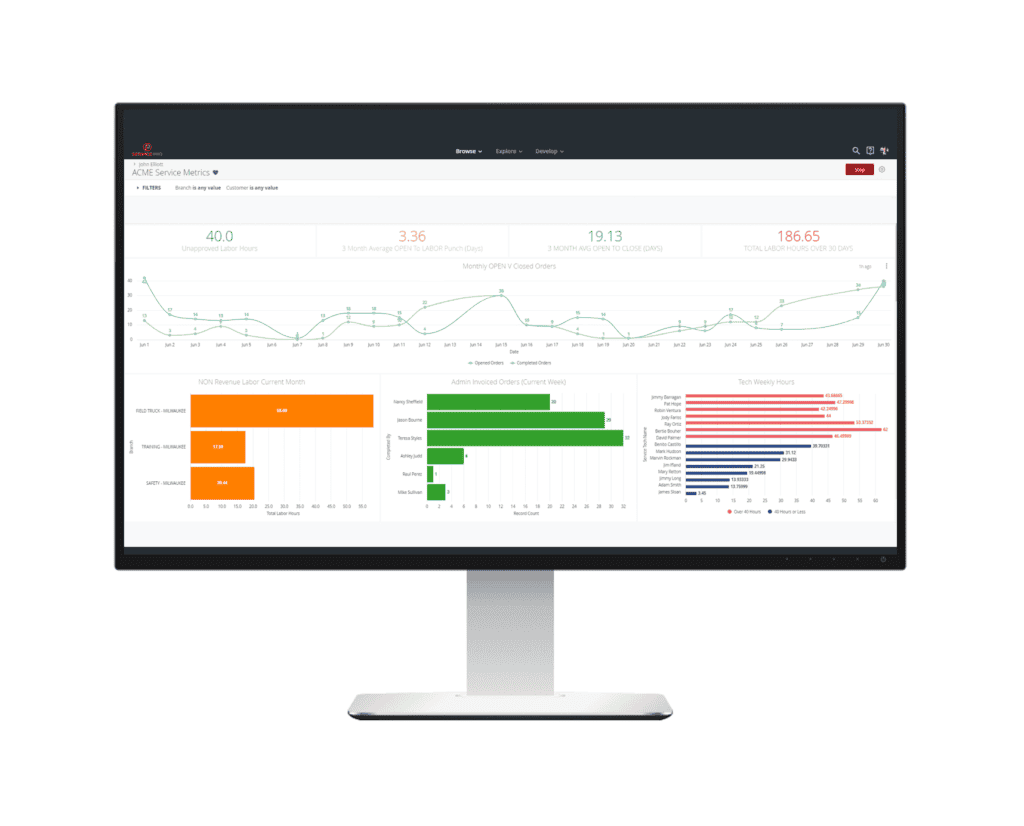The amount and quality of data an organization collects can be a source of great competitive edge. The company enjoys greater customer satisfaction levels and increased profits.
According to research by Aberdeen, field service organizations can increase retention rates by 42% by adopting field service analytics technology.
The nature of field service presents numerous channels from which useful data can be collected. The mobile devices carried by your team in the field and the software installed on them are a major source of useful information. Back office field operations also use logistics technologies from which data can be collected. Other sources of insight include field asset records and CRM data.
Here are a few ways field service business intelligence can help add value to an organization.
Measure and Improve Customer Satisfaction
Field service organizations have the chance to collect information on customer satisfaction. They can develop a set of questions to identify quantifiable indicators of satisfaction.
Customers can rank such things as response times, knowledge of the field specialists, friendliness, and work quality. The information collected gives an organization the chance to improve upon things that customers care about.
The result is average customer satisfaction improves, thus increasing the organization’s credibility and brand image. The company enjoys goodwill, loyalty, and referral business leads from the client base in the long run.
Achieve Field Service KPIs
The use of field analytics can help an organization hit key performance indicators regarding their customers’ assets in the field.
For instance, you can track the number of customers served every week and benchmark it against the number of field service staff you have. You may realize that you need more staff or more vehicles to improve mobility.
Analytics can help track the actual time installed parts last against their expected lifetime. Such data can help decide when to change part suppliers due to poor performance.
An organization can tell whether service teams are taking too long on a single task. For instance, they can attach a GPS device to the vehicle Then, organizations can collect data on the average time spent at each location to determine how technicians could use their time more efficiently. Delays resulting from such things as improper training can be quickly rectified through retraining.
Reduce Operating Costs
Every field service organization needs to track the cost of operations. Even a slight improvement in cost-efficiency could translate to hundreds of thousands of dollars of savings.
A major cost driver is inventory carrying. Field service operations require enough inventory to keep clients’ assets running. However, there is always the risk of overstocking, leading to working capital being trapped in non-moving items. Such items eventually become obsolete and must be written off.
Analytics can reduce inventory carrying costs through insight into parts that are increasing or decreasing in demand. The organization can then make informed decisions on what items to order, how long they will take to arrive, and how long they are likely to stay in stock.
Another major cost for field service companies is fuel and electricity costs. Collecting data on the cost of keeping machines running can highlight areas of inefficiency. Old machines may be using fuel inefficiently. The organization can then conduct a repair-or-replace analysis using the data collected.
Schedule Field Service with Ease
The last decade has seen major improvements in the manner data collection on serviceable machinery takes place. Organizations can collect data from hundreds of data points on a piece of single machinery. This can help predict when a machine is likely to require servicing or replacing.
This possibility places great scheduling power in the hands of field service companies. It is easier to plan and allocate duties to field technicians in advance.
Analytics also gives field technicians a dashboard from where they can check whether parts are in stock. They can have a platform for knowledge sharing and thus improve the overall client experience.
Forecast Required Skill Sets and Human Resource Needs
Studying historical trends can help an organization to better plan its human resource needs. Field service companies often must train new recruits on handling field equipment and the accompanying field management software.
Analytics helps to predict when the company will need to add staff and do so proactively. The company gets to pick people with the right skills and best fit into its culture. Such moves are budgeted for in advance, preventing unexpected shocks in expenditure.
Gain Deeper Insight on Individual Performance
As an organization, customer satisfaction depends greatly on the quality of the staff you have on the ground. Without data, there may be blurry lines regarding the cause of customer dissatisfaction or inefficiencies in resource usage.
However, it becomes easier to narrow down with analytics and distinguish between human errors and non-human errors. If machines handled by a particular employee keep breaking down, this can be pinpointed as an isolated case and not a company-wide problem. If a particular employee consistently receives client complaints, then the organization may need to decide whether to retrain them or let them go.
Analytics takes subjectivity and guesswork away from critical staffing decisions. Past performance data can help develop predictors to help recruit people to take field positions in the future. Once implemented, this staffing method can reduce staff turnover and minimize staffing costs.
Uncover Cross-selling Opportunities
As highlighted, field service operations today can collect millions of dollars worth of data from customers. This data offers companies insights that include new sales opportunities.
For instance, if a client is dealing with an inefficient or obsolete machine, the company can make a case for selling them a new one.
The vast amounts of historical data on a single client present the company with the chance to develop and sell new services. This is the gist of predictive analytics. Businesses can foresee new trends in customer needs and develop the right products. Selling multiple products to a customer increases loyalty and retention, thus securing the business in the long run.
Conclusion: Get the Most Out of Your Service Operations with Field Service Business Analytics
When field service organizations are starting with business intelligence, the first step is deciding on the point of focus. Tracking the right two or three metrics for your business is much more important than tracking a dozen metrics.
Your field service business intelligence system needs to integrate with other systems and operations in your business. For instance, it should be easy for your decision-making managers to find useful reports from your analytics without needing a statistics expert to help. Fortunately, most field analytics software comes with an easy-to-work dashboard to provide valuable insights to managers.
The timeliness of analytics is an essential determinant of the quality of your field service data analytics. Real-time data is the most reliable data, especially when it concerns the health of customer assets in the field. Today, it is possible to build a warning system that sends alerts to relevant staff members when a break-down is imminent.
If your business is looking to gain business intelligence from its field operations, check out MSI Data’s field service management software.
Service Pro Business Intelligence will augment your field operations productivity by enabling your team to get real-time reports on critical service data, including:
- Inventory
- Appointments
- Labor
- Service contracts
- Inspections
- Equipment
To learn more about Service Pro Business Intelligence, request a personalized demo now.








